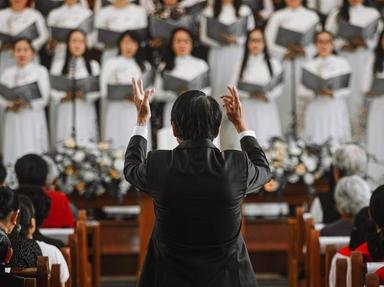Quiz Answer Key and Fun Facts
1. Francis Scott Key is best known as the writer of the U.S. national anthem 'The Star Spangled Banner'. However, he also served as district attorney of Washington, D.C., and wrote two hymns with one of them being 'Before the Lord We Bow'. Key was born in 'The Old Line State' and 'The Chesapeake Bay State'. In what state was Key born?
2. Joyce Kilmer was an American writer, lecturer, editor and poet best remembered for the poem 'Trees'. Before enlisting with the 69th Infantry Regiment, Kilmer wrote the hymn 'No Longer of Him Be It Said'. He was killed in action in the final year of the First World War. In what year did Kilmer die?
3. John Hay studied law with Abraham Lincoln and then served as Lincoln's assistant private secretary when he became president of the United States. Hay, who wrote the hymn 'Defend Us, Lord, From Every Ill', was appointed U.S. ambassador to Great Britain in 1897. Who was the sitting president who appointed him ambassador?
4. John Keble, writer of the hymn 'When God of Old Came Down from Heav'n', was a professor of poetry at a university famous for being the oldest university in the English speaking world. What is the name of the institution?
5. Harriet Beecher Stowe is credited with writing at least five hymns, including 'Knocking, Knocking, Who is There?'. However, she is most famous for being the author of a particular novel. What is the name of the book?
6. Sidney Clopton Lanier, known as the "poet laureate of Georgia", wrote the hymn 'Into the Woods' in 1905. Out of the four events below, which one happened in 1905?
7. Oliver Wendell Holmes, Sr., dean of the Harvard Medical School, wrote the hymn 'Lord of all Being'. In 1857, Holmes also helped found a monthly magazine. What's the name of the magazine?
8. Edmund Spenser was an English poet in the 1500s who many regard as one of the greatest poets of the English language. In addition to writing an epic poem about a never-married English monarch who reigned from 1558 to 1603, Spenser wrote the hymn 'Most Glorious Lord of Life'. Who was the monarch his epic poem was about?
9. William Cowper (1731-1800) was a compatriot of John Newton in opposing the slave trade in Great Britain and wrote the poem 'The Negro's Complaint'. In addition, Cowper wrote a number of hymns, including 'Heal Us,Emmanuel'. In what year did Britain abolish slavery?
10. In addition to writing the U.S. national anthem 'The Star Spangled Banner', Francis Scott Key wrote the hymn 'Lord With Glowing Heart I'd Praise Thee' in 1833. Out of the four events below, which one happened in 1833?
Source: Author
Cowrofl
This quiz was reviewed by FunTrivia editor
agony before going online.
Any errors found in FunTrivia content are routinely corrected through our feedback system.
